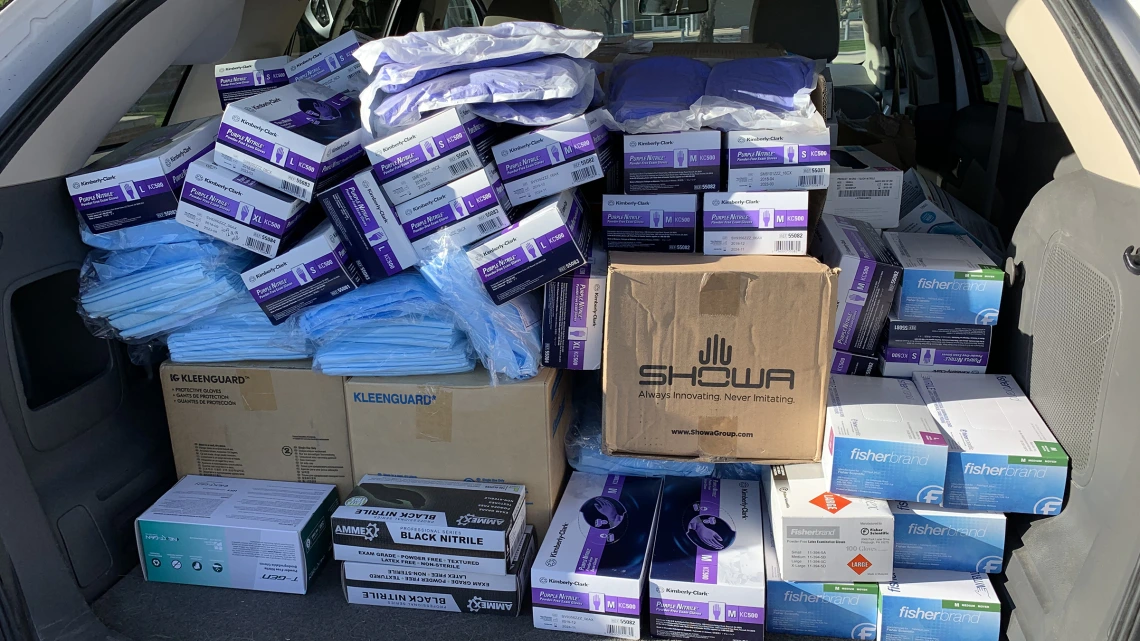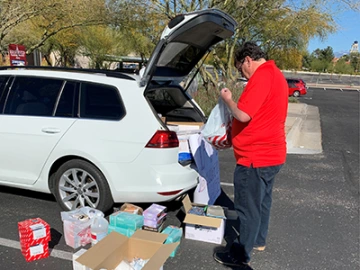Health Sciences Community Unites to Protect Workers on COVID-19 Front Lines
Faculty-led grassroots efforts are yielding donations of personal protective equipment from basic science laboratories, ASTEC and the College of Nursing.

Personal protective equipment donated by Health Sciences’ basic science labs filled four cars.
On Saturday, March 21, Felicia Goodrum, PhD, an immunobiology professor at the College of Medicine — Tucson, woke up and decided it was time to take action against COVID-19.
“I just wanted to do something,” she said. “And I know lots of people felt the same way.”
Dr. Goodrum’s "something” quickly evolved into a grassroots drive for personal protective equipment (PPE) such as face masks, which are vital for health professionals and first responders on the front lines and already in short supply.
Two other large-scale efforts to donate protective equipment were also underway across the Health Sciences, through the Arizona Simulation Technology and Education Center (ASTEC) and the College of Nursing.
Basic Science Labs Pitch In
With the support of Michael Abecassis, MD, dean of the College of Medicine — Tucson, David Salafsky, DrPH, MPH, interim co-executive director of Campus Health, and representatives from Banner Health, Dr. Goodrum immediately connected with people in the Health Sciences basic science labs by email and Twitter. She was hoping to gather PPE donations from university faculty and staff that same afternoon.
“We just put the call out to address the coming need,” she said.

Michael Abecassis, MD, dean of College of Medicine – Tucson, sorts donations during the personal protective equipment drive.
Within a few hours, Dr. Goodrum was in the parking lot outside the BIO5 Institute, her car’s windshield plastered with a “PPE Donation” sign handmade by her daughter, Holland. Faculty and staff dropped off essential N95 masks, face shields, gowns and gloves from nearly 30 different labs. Dr. Goodrum had planned to take the donations to Campus Health using her own vehicle, but she was soon surrounded by enough supplies to fill four cars.
“People only had short notice, but in the first hour, so much was donated. It was amazing,” Dr. Goodrum said. “It says so much about our community – it really is a community where people are very eager to pull together to fill a need.”
With the help of colleague Jean Wilson, PhD, Dean Abecassis, Dr. Salafsky, and John Candito of Banner Health, Dr. Goodrum was able to ensure the donations were transported to Banner and Campus Health.
“The most important thing we can do is make sure our health-care professionals are as protected as they can be,” Dr. Goodrum said. “The donations from our community have made a huge difference to the doctors and nurses and staff of Banner and Campus Health.”
ASTEC and College of Nursing Respond
Brandie Anderson, director of infection prevention at Banner – University Medical Center, reached out to ASTEC Executive Director Allan Hamilton, MD, to ask for supplies from their stock of protective equipment. Dr. Hamilton, along with Dave Biffar, the center’s assistant director of operations, had recently secured the center’s gowns, plastic covers, gloves, face shields and masks under lock and key – a theft-prevention measure spurred by the anticipated high demand for PPE.
“The single most important job we have is to move every single resource we have to the front lines.” Allan Hamilton, MD, executive director of ASTEC
Anderson’s call came in at 10 p.m., and by 8 a.m., the ASTEC team had boxed up its entire PPE inventory for Banner staff use.
“We gave her everything we had,” Dr. Hamilton said. “And it was our privilege to make sure it got to the health care providers on the front lines. I'm very proud of how ASTEC has risen to the occasion and the massive group effort across the Health Sciences.”
The College of Nursing orchestrated protective equipment donations from their simulation labs and clinical spaces in Tucson, Gilbert and Phoenix. Dean Ki Moore, PhD, and Janine Hinton, PhD, director of Steele Innovative Learning Center, helped oversee the process and inventory supplies along with Bertie Estrada, DBH, simulation coordinator at the Gilbert campus.
Being able to respond to the need for PPE is very satisfying for the College of Nursing family,” Hinton said.
The equipment will go to Banner – University Medical Center in Tucson and the Phoenix Children’s Hospital.

